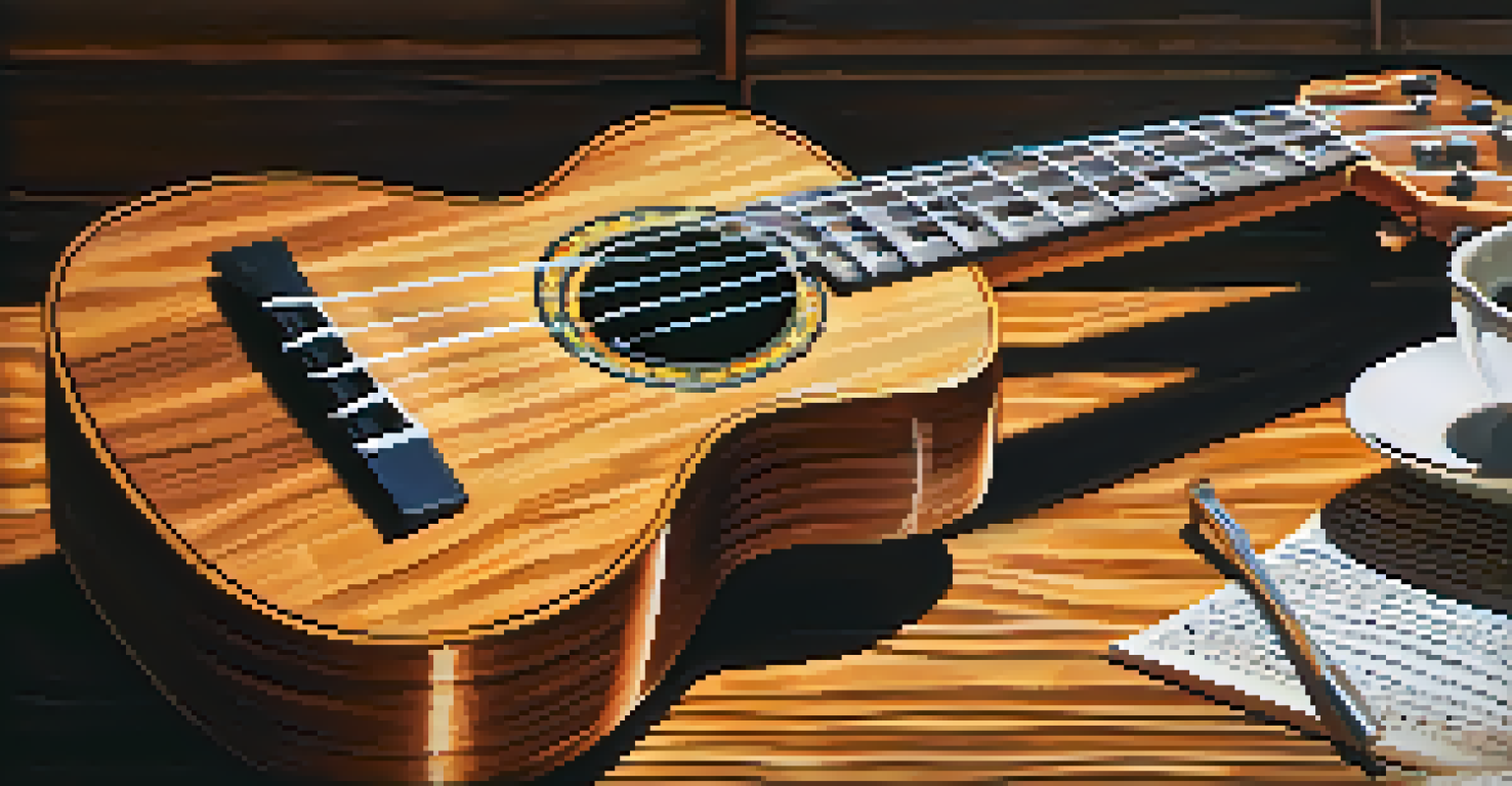The Evolution of Ukulele Music Through the Eyes of James Hill

The Humble Beginnings of the Ukulele
The ukulele originated in the 19th century, brought to Hawaii by Portuguese immigrants. Initially, it was a simple instrument, made from wood and gut strings, used primarily for folk music. Its catchy sound quickly caught on, and the ukulele started to weave itself into the fabric of Hawaiian culture. This little instrument began to symbolize joy and community, setting the stage for its future evolution.
The spirit of the ukulele, rooted in community and connection, continues to inspire musicians worldwide.
As the ukulele gained popularity, it transcended its cultural origins, finding its way into American music scenes in the early 20th century. This transition was marked by its inclusion in vaudeville acts and later, jazz music. The playful and bright tone of the ukulele resonated with audiences, allowing it to flourish in various genres. It was during this time that musicians began to explore its potential beyond traditional Hawaiian melodies.
James Hill, a prominent ukulele virtuoso, often reflects on these early days, highlighting how the ukulele's simplicity made it accessible to everyone. He emphasizes that this accessibility is what allowed the ukulele to evolve into a versatile instrument over the years. Hill believes that the spirit of the ukulele, rooted in community and connection, continues to inspire musicians worldwide.
The Rise of Ukulele in Popular Music
The 20th century saw the ukulele gain traction in popular music, with artists like George Formby and later, the likes of Tiny Tim, bringing it into the mainstream. Their unique styles showcased the ukulele's charm, helping it capture the hearts of new generations. This period marked a significant shift, as musicians began experimenting with the ukulele, blending it into various musical styles such as pop, rock, and folk.

James Hill often speaks about how the ukulele has found a home in modern music festivals and performances. He notes that its portability and lightness make it an ideal instrument for buskers and traveling musicians. This adaptability has allowed the ukulele to thrive in diverse settings, from intimate coffee shops to grand concert halls, expanding its audience and appreciation.
Ukulele's Rich Cultural Journey
The ukulele evolved from its humble Hawaiian origins into a globally recognized instrument, symbolizing joy and community.
Moreover, the internet age has played a crucial role in the ukulele's resurgence. With tutorials and performances readily available online, more people are picking up the instrument than ever before. Hill emphasizes how this digital revolution has democratized music-making, allowing individuals from all walks of life to express themselves through the ukulele.
James Hill's Unique Approach to Ukulele Music
James Hill has carved out a niche for himself by combining traditional techniques with innovative styles. He is known for his ability to blend genres, incorporating elements from classical music, jazz, and even pop into his ukulele performances. This fusion not only showcases his versatility but also helps to push the boundaries of what the ukulele can achieve musically.
The ukulele is more than just an instrument; it's a vehicle for connection and joy.
Hill's teaching methods further reflect his passion for the instrument. He emphasizes the importance of storytelling through music, encouraging his students to find their unique voice. This approach resonates with many aspiring musicians, as it fosters creativity and personal expression, allowing them to connect emotionally with their audience.
Through his work, James Hill has also been instrumental in advocating for the ukulele as a serious musical instrument. He frequently collaborates with other musicians and participates in workshops, aiming to elevate the ukulele's status in the music community. Hill believes that the ukulele, often seen as a novelty, has the potential to stand alongside more conventional instruments in terms of complexity and artistry.
The Global Influence of Ukulele Music
As the ukulele's popularity has spread globally, it has absorbed influences from various cultures. From the ukulele's integration into the vibrant sounds of reggae in Jamaica to its adoption in the folk traditions of Europe, the instrument continues to evolve. This cross-pollination of styles enriches the ukulele's repertoire, making it a truly global instrument.
James Hill often highlights the joy that the ukulele brings to people everywhere, transcending language and cultural barriers. He believes that this universal appeal is one of the reasons why the ukulele has become a symbol of connection and community. Through workshops and performances around the world, Hill witnesses firsthand the unifying power of this small instrument.
Technology Fuels Ukulele Learning
Digital platforms have revolutionized ukulele education, making it more accessible and interactive for aspiring musicians around the world.
Furthermore, the rise of social media has allowed ukulele players from different backgrounds to share their unique interpretations and styles. Platforms like YouTube and Instagram have created a vibrant community of ukulele enthusiasts who inspire one another. Hill sees this as a testament to the ukulele's ability to adapt and thrive in the modern musical landscape.
The Role of Technology in Ukulele Evolution
Technology has played a pivotal role in the evolution of ukulele music, influencing both how it's taught and performed. Digital platforms allow musicians to access a wealth of resources, from instructional videos to virtual jam sessions. This accessibility has made learning the ukulele more engaging and interactive, attracting a diverse audience.
James Hill embraces technology as a tool for creativity and connection. He often utilizes online platforms to reach students worldwide, providing lessons and workshops that cater to different skill levels. Hill believes that technology not only facilitates learning but also fosters a sense of community among ukulele enthusiasts, regardless of their geographical location.
Moreover, advancements in instrument design have led to the creation of ukuleles that cater to various musical styles. Innovative materials and construction techniques have produced instruments that deliver unique sounds and playability. Hill encourages musicians to explore these advancements, as they open up new possibilities for expression and creativity within the realm of ukulele music.
The Future of Ukulele Music: A Bright Horizon
Looking ahead, the future of ukulele music appears promising, with an ever-growing community of players and fans. The instrument's adaptability and charm continue to resonate with new generations, ensuring its place in the musical landscape. James Hill is optimistic about the ukulele's evolution, believing that its future will be shaped by the creativity and passion of its players.
Hill encourages aspiring musicians to embrace their individuality and experiment with the ukulele. He believes that the instrument's simplicity allows for endless possibilities, inviting players to explore various genres and styles. As more people take up the ukulele, the potential for innovation and collaboration increases, creating an exciting environment for musical growth.
Community Unites Through Ukulele
The vibrant ukulele community fosters creativity and connection, celebrating diversity and collaboration among musicians at all levels.
Ultimately, the ukulele is more than just an instrument; it's a vehicle for connection and joy. James Hill's vision for the future includes a world where the ukulele continues to bring people together, celebrating diversity through music. With its rich history and bright future, the ukulele will undoubtedly remain a beloved instrument for generations to come.
Celebrating the Ukulele Community
The ukulele community is vibrant and diverse, uniting people from all walks of life through a shared love for music. From local clubs to global festivals, the sense of camaraderie among ukulele players is palpable. James Hill often participates in events that celebrate this community spirit, highlighting the importance of connection among musicians.
In these gatherings, players share their stories, techniques, and unique styles, creating an enriching environment for learning and growth. Hill believes that these interactions foster creativity and inspire individuals to push their boundaries. The joy of playing music together creates lasting friendships and memories, further solidifying the ukulele's role in building community.

As the ukulele community continues to grow, so does the opportunity for collaboration and innovation. Hill encourages players to connect with one another, whether in person or online, to share their passion for music. This spirit of collaboration is what will propel the ukulele into the future, ensuring its relevance and joy for years to come.